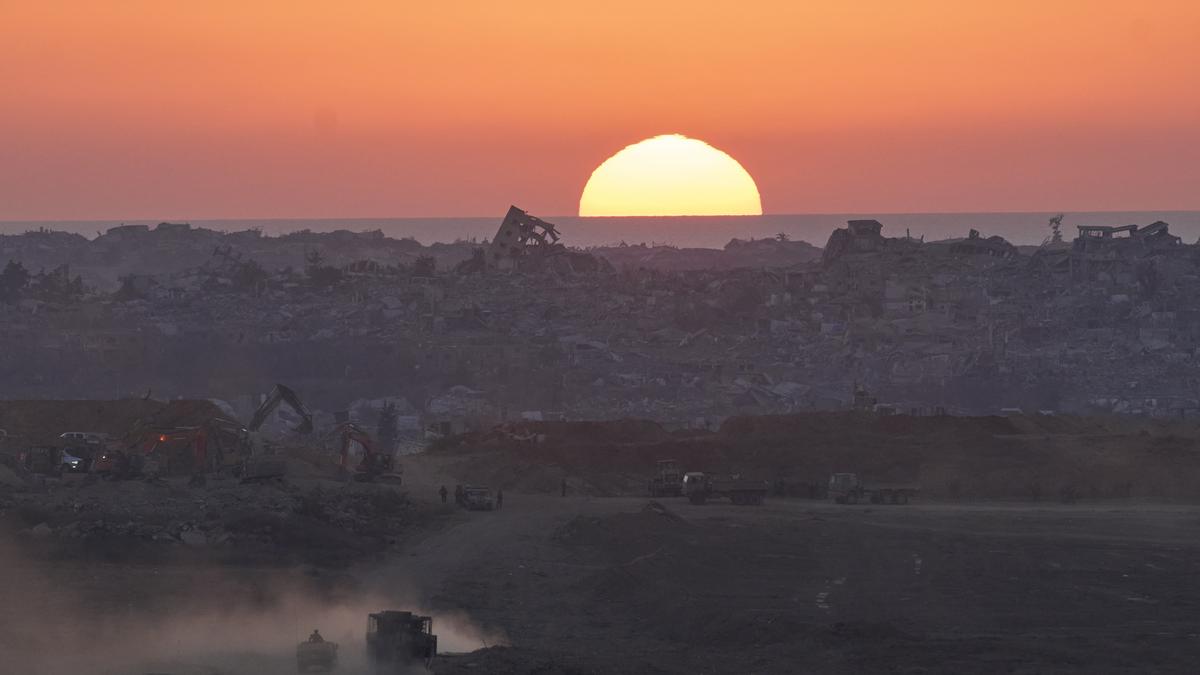
“Lasting peace in West Asia will remain hostage to an indelible sense of injustice and moral outrage”
| Photo Credit: AP
In an era of global conflicts and democratic decline, the question of political leadership in the democratic world has acquired a heightened significance. Intensified rivalries in several parts of the world represent a failure of leadership. The unconscionable ambivalence of world leaders in standing up for principle over expediency, and their abject surrender to hegemonic power, speaks for itself. The tragedies of Ukraine, Gaza, and the Israel-Iran conflict show the ravages of war caused by the insolence of power, untamed by humanitarian interdicts.
Justice above raw power
Despite the fragile ceasefire brokered by U.S. President Donald Trump from a position of overarching military superiority, the footprints of these hostilities will remain visible symbols of an oppressive exercise of military power that has taken thousands of innocent lives. Those responsible for the catastrophe have clearly forgotten the abiding lesson of history that people carrying a festering wound in their souls find closure only when injustice is avenged. Lasting peace in West Asia will remain hostage to an indelible sense of injustice and moral outrage.
It is, therefore, imperative to foster leadership that values justice above raw power. In the deeply distressing trans border conflicts that have driven the world perilously close to a global war, the moral and intellectual impoverishment of the principal actors has raised concerns about the failure of contemporary democracies to yield inspiring leadership, answerable to the ‘injunctions of conscience’. The pretence of a functional rules-based international order helmed by the United Nations Charter stands demolished yet again, reconfirming the impotence of international law in outlawing the use of force in relations between nations. The illegal invasion of Iraq and parts of Ukraine are no more than footnotes of history.
Lessons to learn
But there are lessons to be learned. The world needs leadership, driven by a search for global consensus and subject to the discipline of international law to address the defining challenges of our times, including the settlement of territorial disputes. This is a particularly important reminder for those who claim to lead the democratic world and propound the necessity of a credible international legal order.
Democratic leadership is about walking alone in defence of principle, where necessary. It is about holding on to the truth against all odds and empowering the weak. It is about uniting people in trying times and advancing human dignity by removing disparities. Inspirational leadership is about an unremitting endeavour to create favourable conditions of social and political existence that can optimise the realisation of human potential in an environment of peace and harmony. And as shown in the tortuous process of securing a fragile truce between Israel and Iran, deceit and two-facedness annul leadership.
Leadership does not emerge out of a vacuum. As Karl Marx reminded us famously, ‘Men make their own history, but they do not make it as they please… [they do so] under circumstances existing already, given and transmitted from the past.’ The French statesman Chateaubriand proclaimed that ‘the leader of the nation must be the leader of the times’, so that his exertions mirror the aspirations of the people and invest politics with a moral purpose larger than himself. The current global conflicts present an opportunity for democracies to look inwards for correction and to reinforce their appeal.
In defence of justice
Indian democracy, which has survived several vicissitudes and a ‘thousand mutinies’, has been enriched by the exertions and selflessness of several of its towering leaders. They were led by Mahatma Gandhi, who defined for us the meaning of transformative leadership. The Mahatma’s promise of politics, impervious to the trappings of power and rooted instead in the moral imagination of the people yearning for freedom and dignity, enabled him to forge a sustainable non-violent struggle against injustice. He accomplished the ‘will of his age’, defined it for the people, and personified it.
As a proud inheritor of the Gandhian legacy of morality-driven politics and drawing strength from its civilisational ethos of ‘Vasudhaiva Kutumbham’, India must stand out in defence of justice everywhere. It must flex its moral muscle for shaping a just world order. Its economic heft, nuclear capabilities, and regional power status should enable India to espouse international morality without compromising its strategic autonomy or without alienating key allies.
In these defying times, we must summon our tallest leaders to collectively energise Indian democracy. They must establish the exceptionality of their leadership in the service of national goals and global peace. Our leaders must ‘reinforce the tone of modesty’, introduce dignity at the centre of political processes, revive the spirit of collegiality, be seen as symbols of hope in times of fracture and fear, and re-purpose their politics beyond the pursuit of raw power.
At this juncture of the nation’s history, when domestic and external challenges threaten the social accord and disruptive shifts in the power pendulum are testing the societal equilibrium, we need leadership that is strong and compassionate, resolute but conciliatory, and decisive while striving for democratic consensus on critical issues.
Ashwani Kumar, former Law Minister; senior advocate, Supreme Court; and author
Published – July 08, 2025 01:53 am IST
